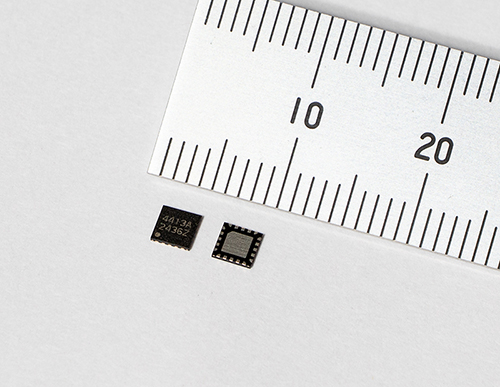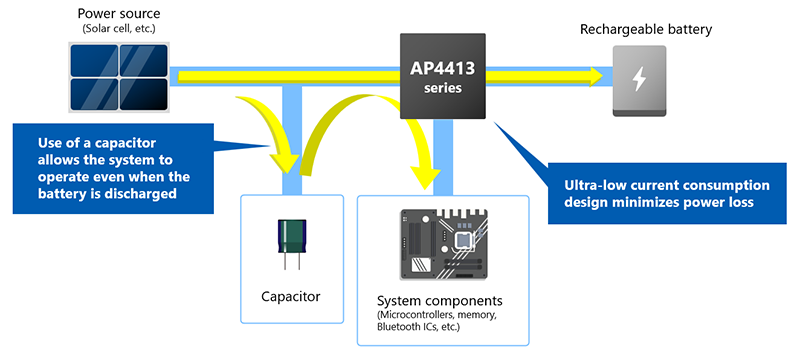Asahi Kasei Microdevices launches new series of power management ICs for energy harvesting
Optimizing charge and discharge of rechargeable batteries in remote controls, IoT sensors, Bluetooth® trackers, etc.
April 16, 2025
Asahi Kasei Microdevices Corp.
Asahi Kasei Microdevices (AKM) has developed the AP4413, a new series of ultra-low current power management ICs (PMICs) ideal for battery charging systems used in energy harvesting1 applications. The AP4413 series enables efficient battery charging while consuming an extremely low current of 52 nA and features four variants with voltage threshold characteristics matching several common rechargeable battery types. The AP4413 comes in a tiny 3.0 × 3.0 × 0.37 mm HXQFN package and has been in mass production since February of 2025.
Equipped with AKM’s proprietary ultra-low current voltage monitoring system, the AP4413 series enables autonomous charging of a small rechargeable battery via energy harvesting, which is becoming increasingly common across a wide range of applications such as remote controls, Bluetooth® trackers, and IoT sensors, which have traditionally used disposable batteries. This is particularly relevant in Europe, where the transition to rechargeable batteries is being promoted by Regulation (EU) 2023/1542 to evaluate the feasibility of phasing out disposable batteries.2
 Fig. 1 - AP4413 series of PMICs for energy harvesting
Fig. 1 - AP4413 series of PMICs for energy harvesting
AKM has accumulated wide-ranging expertise in product technology and applications through the development and mass production of PMICs for energy harvesting. These devices allow system designers to utilize small amounts of ambient environmental energy, such as indoor light and body heat, to operate a variety of electronic devices, many of which are battery-operated. This is especially beneficial for IoT environmental sensors such as CO2 monitors that are installed in locations where line power is not easily accessible, and where battery replacement would be difficult.
Using energy harvesting to charge batteries is challenging, because the harvested voltage and current tend to be small and often unstable. It is therefore essential to minimize the PMIC’s power consumption and prevent excessive charging and discharging. The AP4413 series’ ultra-low 52 nA current consumption has minimal impact on a system’s power budget, and its voltage monitoring system prevents rechargeable batteries from becoming completely discharged, allowing for quick startup and/or recovery. Furthermore, the addition of an inline capacitor (see figure 2) allows the AP4413 series PMICs to support system operation even when the battery is completely discharged, while recharging it at the same time.
- 1Technology to convert small amounts of ambient energy into power, utilizing various forms of energy such as light, vibration, heat, and radio waves.
- 2Regulation - 2023/1542 - EN - EUR-Lex
 Fig. 2 - AP4413 PMIC: System configuration example
Fig. 2 - AP4413 PMIC: System configuration example
For more information on the AP4413 series PMICs, visit
https://www.akm.com/global/en/products/energy-harvesting/lineup-energy-harvesting/pmic/
About Asahi Kasei Microdevices (AKM)
AKM, a Japan-based company, operates an electronic components business as a member of the Asahi Kasei Group's Material sector. AKM provides customers with unique products by combining the compound semiconductor technology used in magnetic sensors with the ASIC/analog circuit technology used in silicon semiconductors. AKM's unique products and solutions are featured across a wide range of markets, including mobile communication devices and consumer products, as well as automotive electronics devices, household equipment, and industrial equipment.
Additional information is available on https://www.akm.com/global/en/.
About Asahi Kasei
The Asahi Kasei Group contributes to life and living for people around the world. Since its foundation in 1922 with ammonia and cellulose fiber business, Asahi Kasei has consistently grown through the proactive transformation of its business portfolio to meet the evolving needs of every age. With more than 49,000 employees worldwide, the company contributes to sustainable society by providing solutions to the world’s challenges through its three business sectors of Material, Homes, and Healthcare. For more information, visit https://www.asahi-kasei.com.
Asahi Kasei is also dedicated to sustainability initiatives and is contributing to reaching a carbon neutral society by 2050. To learn more, visit https://www.asahi-kasei.com/sustainability/.
